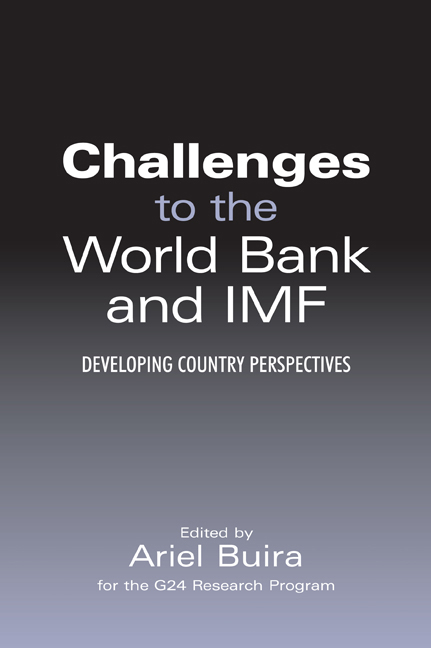Book contents
- Frontmatter
- Contents
- Contributors to this volume
- Foreword
- Introduction
- 1 The Governance of the IMF in a Global Economy
- 2 Who pays for the IMF?
- 3 An Analysis of IMF Conditionality
- 4 Achieving Long-Term Debt Sustainability in Heavily Indebted Poor Countries (HIPCs)
- 5 The Poverty Reduction Strategy Paper Approach: Good Marketing or Good Policy?
- 6 Capital Management Techniques in Developing Countries
- 7 International Reserves to Short-Term External Debt as an Indicator of External Vulnerability: The Experience of Mexico and Other Emerging Economies
- 8 Mechanisms for Dialogue and Debt-Crisis Workout that Can Strengthen Sovereign Lending to Developing Countries
- 9 Developing a Global Partnership for Development
- 10 International Financial Institutions and International Public Goods: Operational Implications for the World Bank
- Index
8 - Mechanisms for Dialogue and Debt-Crisis Workout that Can Strengthen Sovereign Lending to Developing Countries
Published online by Cambridge University Press: 10 September 2020
- Frontmatter
- Contents
- Contributors to this volume
- Foreword
- Introduction
- 1 The Governance of the IMF in a Global Economy
- 2 Who pays for the IMF?
- 3 An Analysis of IMF Conditionality
- 4 Achieving Long-Term Debt Sustainability in Heavily Indebted Poor Countries (HIPCs)
- 5 The Poverty Reduction Strategy Paper Approach: Good Marketing or Good Policy?
- 6 Capital Management Techniques in Developing Countries
- 7 International Reserves to Short-Term External Debt as an Indicator of External Vulnerability: The Experience of Mexico and Other Emerging Economies
- 8 Mechanisms for Dialogue and Debt-Crisis Workout that Can Strengthen Sovereign Lending to Developing Countries
- 9 Developing a Global Partnership for Development
- 10 International Financial Institutions and International Public Goods: Operational Implications for the World Bank
- Index
Summary
Abstract
A positive future for foreign private lending to developing countries requires reducing perceived risk through mechanisms for more permanent debtor-creditor ‘conversation’, and an accepted and effective ‘bankruptcy’ approach to orderly workouts from unavoidable sovereign defaults. The IMF began a serious debate on this issue by proposing a Sovereign Debt Restructuring Mechanism (SDRM) for orderly workouts of sovereign debts in default. Somewhat surprisingly, the creditor banks, the US Treasury, and the emerging market countries have all rejected the Fund's SDRM approach to debt restructuring. The emerging market countries are concerned that the SDRM approach would significantly increase the high ‘spread’ or the risk premium they already have to pay for foreign loans. The chapter makes certain suggestions and revisions to the Fund's SDRM approach to make it more acceptable to all parties involved, and to preserve its bite. For example, the chapter advocates including bilateral official creditors in SDRM negotiations, making a mediation service available to negotiating countries, retaining an effective but temporary ‘stay’ mechanism and, most importantly, separating the mechanism as a whole from the IMF by seeking to enact an international law through a stand-alone treaty. I conclude by warning that premature closure around this controversial, but extremely important, proposal could rob the international system of measures for increasing investor and citizen confidence. I thus call for further consideration of the matter in all relevant forums.
1. Introduction
Reducible market uncertainty makes the perceived risk in foreign lending to the governments of developing countries higher than it need be. In part, the culprit is the shift in the composition of creditors in syndicated loans toward buyers of bonds. The open information and communication needs of bond investors are larger than those of multinational banks, which were the main intermediaries for international lending in earlier decades, and the mechanisms to work out from a default on sovereign bonds are not as developed as they have been for default on international bank loans. There are also controversies and thus uncertainties about how losses in a work out from a crisis should be shared among the various private and official creditors of a defaulting government, and between the country and its creditors as a whole.
In this chapter, I argue that the uncertainty can be reduced through a regular, ongoing dialogue between the borrowing government and its creditors, and that mechanisms can be conceived for carrying this out.
- Type
- Chapter
- Information
- Challenges to the World Bank and IMFDeveloping Country Perspectives, pp. 203 - 226Publisher: Anthem PressPrint publication year: 2003



